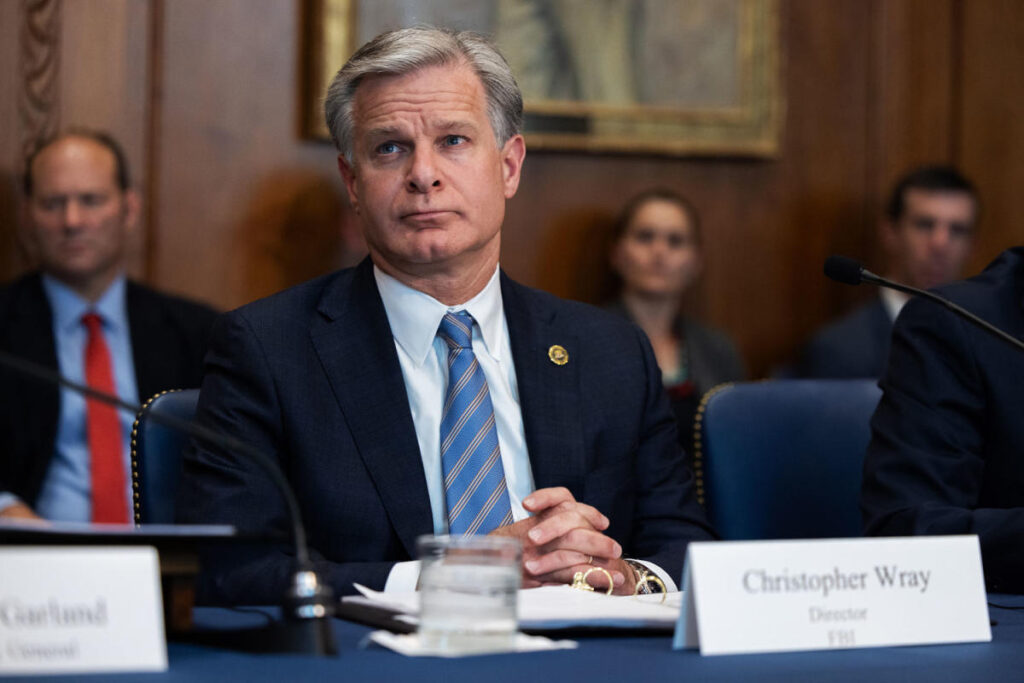In the wake of Donald Trump’s announcement about appointing Kash Patel as the new director of the Federal Bureau of Investigation (FBI), significant tension has arisen regarding the future leadership of one of the nation’s paramount law enforcement agencies. This announcement, coming 11 days ago, implied Trump’s intention to remove Christopher Wray, the current FBI director whom he himself appointed seven years prior amidst the turbulent events surrounding James Comey’s firing. Although Wray’s term is not due to conclude until 2027, Trump seems inclined to terminate Wray’s position early, an act he notably failed to mention directly during his proclamation about Patel, thereby raising questions about his motivations and the implications on institutional integrity.
During a recent interview on “Meet the Press,” NBC News’ Kristen Welker pressed Trump on the matter of Wray’s potential dismissal. Trump expressed clear dissatisfaction with Wray, particularly aimed at the FBI’s investigation into classified documents allegedly kept at Mar-a-Lago, which he described as an “invasion.” The characterization of the FBI’s actions as an invasion overlooks the fact that the FBI acted under a court-approved search warrant after Trump reportedly disregarded a federal subpoena. Furthermore, Trump provided no credible justification for wanting to replace Wray, relying instead on fabrications regarding crime rates and mischaracterized immigration issues, which divert from the FBI’s mandate, showcasing a disconnection from factual realities.
The current political climate, marked by norms being disregarded, has produced a stark contrast to what might typically be a momentous controversy regarding the potential firing of an FBI director without cause. In a typical democratic environment, such an action would elicit significant pushback and scrutiny, likely culminating in extensive debates over accountability and governance. However, under the contemporary Republican-controlled Senate and given the prevailing partisan dynamics, it seems probable that Trump’s radical choice, Patel, will receive swift confirmation, which would further signal a troubling erosion of institutional checks and balances.
Republican Senator Chuck Grassley, poised to lead the Senate Judiciary Committee, signaled alignment with Trump’s sentiments by issuing an 11-page letter urging Wray’s resignation, signaling a wider Republican distrust of the FBI’s current administration. Grassley’s discontent stemmed from Wray’s unwillingness to pursue investigations against political opponents, such as Hillary Clinton, and allegations against President Joe Biden, emphasizing a selective commitment to accountability that reflects current partisan divisions. Such positions not only undermine the credibility of the agency but also demonstrate how political agendas can increasingly shape judicial oversight and law enforcement priorities.
This tension between Trump and Wray reached a peak earlier this year during a House Judiciary Committee hearing, wherein Wray faced a barrage of bizarre conspiracy theories propagated by certain GOP members. Wray’s candid admission that some of the inquiries were “insane” underscores a critical schism within not just the party, but the understanding of truth in political discourse. His attempt to defend the FBI’s reputation against unfounded claims speaks to the challenges of maintaining the agency’s integrity amid hyper-partisan scrutiny, showcasing how political leaders often exploit misinformation for their narratives while disregarding the foundational truths that govern proper governance.
In conclusion, the unfolding scenario surrounding Kash Patel’s potential appointment as FBI director poses profound implications for the institution’s future. Trump’s expressed intentions reveal a blatant disregard for factual truths and traditional norms, underscoring a broader trend of politicizing law enforcement and judiciary processes. As the Republican apparatus rallies behind this surprising move, it becomes increasingly crucial to assess not only the motivations underlying such leadership shifts but also the potential repercussions on the FBI’s operational integrity and the broader implications for American democracy. The tension between political leaders’ narratives and the foundational responsibilities of institutions like the FBI continues to highlight the challenges of governance in a polarized political landscape.

